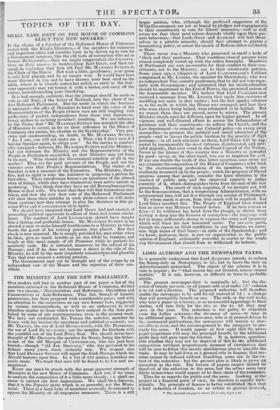THE MINISTRY AND THE NEW PARLIAMENT. - OUR readers will
find in another part of our paper a list of the members returned to the Reformed House of Commons, divided into two classes,—Ministerialists and Reformers, Opposition and Conservatives or Anti-Reformers. This list; though of- humble pretensions, has been prepared with considerable pains; and with an attention to the corrections on our own former lists, suggested by various correspondents, as well as an endeavour to avoid blunders similar to those which we have noticed in the lists pub- lished by some of our contemporaries, even in the present week. We have not confounded Mr. TOOKE the solicitor, member for Truro, with his brother the merchant and political economist ; nor Mr. TREVOR, the son of Lord DUNGANNON, With Mr. PONSONBY, the son of Lord DUNCANNON; nor the member for Durham with the youthful son of the Lord Privy Seal. We should never have thought of Mr. DEN] SON, the member for Surry, being the father- in-law of the old Marquis of CONYNGHAM, who has just been buried,—though "old JOE DENISON," who was gathered to his fathers many years since, certainly was. We suspect also that Lord DUDLEY STUART will reject the Irish Peerage which the Herald bestows upon him. In a list of 658 names, mistakes are easily made. We trust that ours will be found to be few and un- important.
Every one must be struck with the great apparent strength of Ministers in the new House of Commons. And yet, if we come to analyze the composition of it a little more closely, v e shall see cause to correct our first impressions. We shall film discover, that it is the Popular party which is. so powerful, not the Minis- terial. There is a large body of members avowedly delermined to oppose the Ministry on all unpopular measures. Theie is a still larger portion, who, although the. prefeised. supporters of the Whig Government, are yet so bound by pledges and engagements to their constituents to vote for measures,—and. so well aware too that their 'next return' depends, 'wholly upon their ,pre- sent behaviour,—that Lords GREY. and Aeriloro will find them- , selVes in a pitiable minority, should they. attempt to pursue, a • temporizing policy, or arrest the march of Reform either in Church or State.
There never was a Ministry who possessed so small a body of- " thick and thin" partisans. That worthless class of persons were almost completely rooted up with the rotten boroughs. Members of Parliament are now answerable for their conduct to their con- stituents, not to the Ministry, nor to their aristocratic patrons. Some years ago, a whipper-in of Lord CASTLEREAGH'S Cabinet complained to Air. LYSTER, the member for Shrewsbury, who was an independent Tory country gentleinan,that he did not vote regu- larly with Government ; and intimated, that his insubordination should be mentioned to the Earl of Powts, the presumed patron of • the honourable member. We believe that Lord CASTLEREAGH received a message from Mr. LYSTER that made him cautious of meddling any more in that matter ; but the' fact speaks volumes as to the mode in which the House was managed, and how they who were above being bribed, were•attempted to be bullied. But , we repeat, those days are passed, never to return. The present Ministry stands upon far different, upon far higher ground. 'In all vigorous and well-directed efforts to secure, 'the ' independence of members and their constituents—to reform the Churah, and the Law department-to remodel our Colonial policy—to sweep. away monopolies—to promote the political and moral education of lip'" people—and to lessen the public burdens by the practice of' tygitl economy,—in all such attempts as these, Lord GREY Will be sti,p7, ported by incomparably the most virtuous, disinterested, and pew:: erful majority, that ever voted in the Great Council of. the Nation. Never in the history of this country was a Ministry so pdwerftil , for good: never, on the other hand, was one so impotent for evil. , If any one doubts the truth of this latter 'assertion, once More wd say, examine the composition of the House of Commons; refer back to the electioneering professions of* its members; which are studiously treasured up by the people; watch the progrees'of lileral opinions among that people; consider the keen attention le' the' conduct of public men, and the improved 'capacity td judge correctly of it, which distinguishes them from the men of the last generation. The result of such inquiries, if we mistake net, will be the firmconviction, that a temporizing Administration, With an aristocratical bias, will not live through one session of Parliament.
To whom much is given, from him much will be required. Let Lord GREY recollect this. The People of England have trusted him as never was Minister trusted before. If he turn craven or false—if lie withdraw his hand from the plough, or 'shrink from driving it deep into the furrows of corruption—the language will . fail in terms sufficiently strong to express the scorn and ignominy . which will blast his now honoured name. For our mu parts, . though we repose no blind confidence in any Minister, we enter- ; tam n high hopes of Earl GREY—in spite of the Speakership; and we know, moreover, there is now an organization' in the public opinion of England, sufficiently powerful to scatter to- the winds. any Government that should dare to withstand its behests.


















 Previous page
Previous page